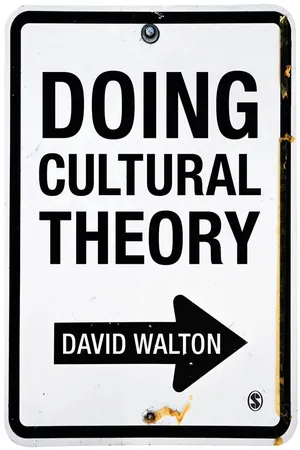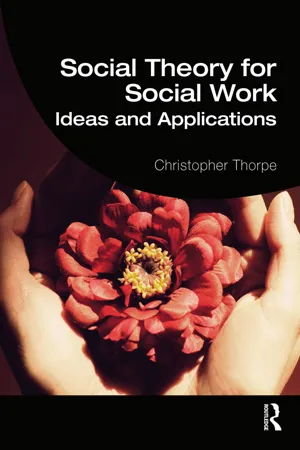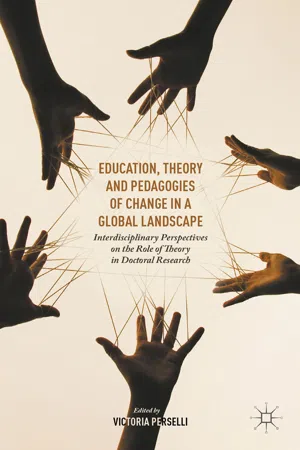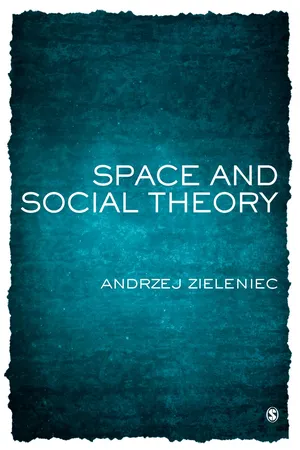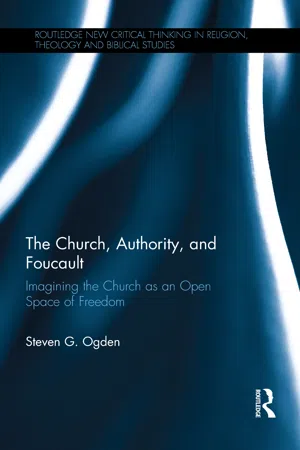Social Sciences
Michel Foucault
Michel Foucault was a French philosopher and social theorist known for his influential work on power, knowledge, and the relationship between them. He critiqued traditional views of power and emphasized its pervasive nature in social institutions and practices. Foucault's ideas have had a significant impact on fields such as sociology, anthropology, and cultural studies.
Written by Perlego with AI-assistance
Related key terms
8 Key excerpts on "Michel Foucault"
- eBook - ePub
- Inger Furseth, Pål Repstad(Authors)
- 2021(Publication Date)
- Routledge(Publisher)
3 Michel FoucaultDiscourse, power, and governmentality
DOI: 10.4324/9781003181446-4Michel Foucault (1926–1984) was a significant figure in French philosophical debates on reason, language, knowledge, and power. His academic field was the history of ideas, or global intellectual history, as it is now called—and even if he was not a sociologist, his work dealt with sociological issues. He has greatly influenced the work of other sociologists, like Pierre Bourdieu and Patricia Hill Collins (see Chapters 6 and 10 ). Especially his work on madness, imprisonment, sexuality, and governmentality has been of great interest for sociologists. Foucault’s project was to detect the different discursive practices that exercise power over the human body. He thought that knowledge does not necessarily lead to liberation, but that knowledge forms the basis for new means of control. His work ranges over a number of disciplines, both history, criminology, psychiatry, philosophy, and sociology.Foucault did not offer any systematic examination of religious themes. Even if he was an atheist, he looked at Christianity as an important shaping force in the Western world. From his early discussions of religion in the 1950s and 60s, where he discusses the role of religion in the history of madness, to his analyses of confession from 1976 and view on the Protestant Reformation and the Iranian Revolution in 1979, there are several implicit and explicit ideas about religion in his work (Carrette 1999).In the following, we will first take a look at his biography and the French intellectual context in which he worked, before we describe central themes in his work, such as modern science, discourse, the institutionalization of power, and governmentality. Then, our focus shifts to religion, critique of his work, and use in the sociology of religion.Biography
Foucault was born into a wealthy family in Potiers, France in 1926. His father was a surgeon and obstetrician, and his mother was independently wealthy. He first attended local state schools before he transferred to a Catholic school. He received his baccalaureate with distinction, but he refused to follow in his father’s footsteps as a doctor, and instead he studied philosophy and psychology at the prestigious École Normale Supérieure in Paris. Here, he became acquainted with Louis Althusser, who introduced him to Marxism. Foucault joined the Communist party in 1950, only to leave it three years later. - eBook - ePub
- David Walton(Author)
- 2012(Publication Date)
- SAGE Publications Ltd(Publisher)
9
Discourse and Power
Michel Foucault
Learning goals- To see why Michel Foucault’s work has been associated with poststructuralist approaches.
- To understand the importance of discourses to Foucault’s ways of thinking culture and to appreciate how they systematically form the objects of which they speak.
- To grasp how reason, truth, knowledge and power interrelate in Foucault’s writings.
- To see how the discursive approach helps to illuminate Foucault’s ideas about history and gives insights into how he approached surveillance and modern constructions of sexuality.
ConceptsThe key concepts introduced in this chapter are: the critique of reason, knowledge, truth, power, discourse, anti-essentialism, self-regulation, surveillance, the Panopticon, genealogy and the history of sexuality.Introduction
This chapter will begin by discussing the status of Foucault’s contribution to cultural studies and go on to introduce Foucault’s ‘discursive’ approach to cultural analysis and his critique of reason. This will be followed by a discussion of how Foucault theorized the relationships between knowledge, truth and power and this will be illustrated with reference to his ideas on self-regulation, surveillance and control. The chapter will then return to the discursive side of Foucault’s work by exploring the idea of ‘man’ as a construction within the discourses of the sciences. This will serve as an introduction to Foucault’s theory of history, which will be developed through dominant themes which he elaborated in his history of sexuality. The general approach is to connect Foucault to writers already introduced and prepare the way for an understanding of how Judith Butler united Foucauldian approaches with those of other poststructuralist thinkers. - eBook - ePub
Social Theory for Social Work
Ideas and Applications
- Christopher Thorpe(Author)
- 2017(Publication Date)
- Routledge(Publisher)
This chapter critically engages with these questions by drawing on the theoretical ideas of French thinker Michel Foucault (1926–1984). Foucault’s work has provided a rich set of theoretical resources for social work and healthcare academics (Chambon et al., 1999; Garrity, 2010; Powell, 2012; Powell and Khan, 2012; Hardy, 2015). The concepts of ‘discourse’ and ‘governmentality’ in particular have been used to critically interrogate the relations between the state, social workers and service-users. Foucault’s work has also been used to raise questions about the rise of surveillance discourse and practice within social work (Garret, 2005; Parrot and Madoc-Jones, 2008; Parton, 2008; Selwyn, 2002). Engaging with these themes, this chapter begins by explicating the concepts of discourse and governmentality and the importance of these for the view that social workers operate now in a ‘surveillance society’. We then use these concepts to think about issues of care and control with reference to the social work relationship. Specifically, the categories used to construct the recipients of social work services, the increasing ‘digitization’ of social work and the rising dominance of individual-centred and ‘psych-’ discourse within social work education.Language, discourse and power
Michel Foucault was a French social theorist, historian and philosopher. Foucault’s early work was influenced by French structuralist theory, whereas his later work played a formative role in the development of post-structuralism in France. Structuralism employs a depth metaphor for thinking about social reality. In this view, what takes place at the surface level is in actuality determined by social structures operating at a far deeper level of reality. At a surface level, social life appears changeable, characterised by a constant flux of fleeting interactions, situations and events. Structuralists claim that what takes place at a surface level is in fact determined by relatively static and enduring structures operating at a deeper level. Structuralists direct their attention towards the underlying structures that condition what takes place at a surface level. - eBook - ePub
- David Scott(Author)
- 2007(Publication Date)
- Routledge(Publisher)
Michel Foucault and power-knowledgeOlssen (2004, p. 64) offers a Foucauldian view of the disciplines:In the previous chapter, I discussed a foundationalist view of knowledge, which curriculum theorists in the 1980s found particularly attractive. Michel Foucault, arguing from a different standpoint, developed a relativist view of knowledge (cf. Taylor, 1998), in which power and knowledge are inextricably related. Modernist curriculum thinkers, such as Lawrence Stenhouse and Jerome Bruner, argued that knowledge needs to have its roots in the disciplines and that pedagogic knowledge at its best reflects the optimum translation of this knowledge into the curriculum. For Foucault, this transcendental move to provide a foundationalist view of the curriculum is misguided in that it is not possible to have any certainty about the correctness or otherwise of how the curriculum should be constructed. Foucault understood the disciplines as discursive formations, as having no foundational status, and as being embedded in history.In methodological terms, the central key to understanding the disciplines as discursive formations is as structures 1) which manifest definite rules and regularities; 2) where these rules and regularities are compatible with the episteme of the age in the sense of establishing limits and exclusions, and are affected by the practical constraints of institutional power and control within the social structure; 3) which determine and limit the conditions of possibility, i.e. what it is possible and legitimate to say and write, what counts as reason, argument, or evidence; 4) which are autonomous in the sense that they do not integrally represent being; 5) which are anonymous in the sense that they are not linked to or embodied in individual subjects but are themselves, ontologically, part of a discursive regularity; 6) which go through transformations and experience radical discontinuities at particular periods which are sharp but not complete; 7) which constitute forms of power that shape subjects and assist in the regulation of social life through the process of normalisation - eBook - ePub
Education, Theory and Pedagogies of Change in a Global Landscape
Interdisciplinary Perspectives on the Role of Theory in Doctoral Research
- Victoria Perselli, Victoria Perselli(Authors)
- 2016(Publication Date)
- Palgrave Macmillan(Publisher)
Archaeology of Knowledge (1972) presented an arduous challenge; however, working online did not deter reading and rereading Foucault’s major works and interrogation of his research methods. The students who attended face-to-face class meetings encountered the same challenges with Foucault’s dense and sometimes difficult text. Nevertheless, both the online and face-to-face students applied his assertions in meaningful ways to grapple with comprehending the exercise of power through the curriculum.Studying the works of Michel Foucault is not typical of Colleges of Education in the US. Although most Masters and doctoral students of Curriculum and Instruction in my university in the Southwest study procedures, processes and some philosophical considerations of creating curricula for instructional purposes, they rarely critique the creation of curriculum as an exercise of power. This summer school seminar was geared towards inspiring graduate students’ engagements with curriculum knowledge as an exercise of power.Early in Foucault’s academic career, he focused on discourses of knowledge as a mechanism of exercising power, usually from a sector of society entrusted with policy formulation, downward to subjects of the lower echelons of society where individuals and groups have less power. Foucault’s assertions about discourses as mediated systems that exert social, economic, governmental and other forms of control are an important piece of understanding the curriculum as a set of discourses and associated practices that harness and usually act upon the individual. Later in his career, he focused on the state’s harnessing of ‘bio-power’ (Foucault, 1978: 140) of the masses for social control, as well as for furthering the interests of the state’s exertion of bio-power. According to Gordon (1991) in his ‘governmental’ rationale Foucault discussed ‘the conduct of conduct’ and ‘a form of activity aiming to shape, guide, or affect the conduct of some person or persons’ (Gordon, 1991: 3). For Foucault, ‘governmentality - eBook - ePub
Beyond Critique
Exploring Critical Social Theories and Education
- Bradley A. Levinson, Jacob P. K. Gross, Christopher Hanks, Julia Heimer Dadds, Kafi Kumasi, Joseph Link(Authors)
- 2015(Publication Date)
- Routledge(Publisher)
Foucault 1990a , 95). Power relations are never one-directional. They always require some measure of freedom, reversibility, and resistance. Foucault’s claim that resistance is a necessary part of power has been interpreted by his critics to mean that resistance is futile—but Foucault resists such pessimism. He argues that there is always a multiplicity of sites of resistance containing the potential for change.- Knowledge is a form of power. There is no employment of knowledge that does not also constitute a utilization of power. Knowledge and power are therefore not external to one another—they are intertwined. The truth does not set one free; rather, it subsumes one under the rules of a particular game of truth.
Panopticism
One of Foucault’s most illuminating metaphors is his take on Jeremy Bentham’s panopticon. Picture, if you will, a circular building with a tower constructed in the middle. Each of the cells or rooms in the building is attached to the tower so that the inhabitants—be they prisoners, schoolchildren, or patients—always risk being under the gaze of a supervisor located in the tower. Designed so that no inhabitant knows when he or she is being watched, surveillance becomes normalized, “permanent in its effects,” inducing “in the inmate a state of conscious and permanent visibility that assures the automatic functioning of power” (Foucault [1977 ] 1995 , 201).Though Bentham’s panopticon was never actually built, Foucault argues that it is an apt metaphor for new forms of disciplinary power in which technologies of surveillance and discipline are refined and spread throughout the social body, serving as an organizing and normalizing force and the locus for detailed examination of social life. In contrast to an older reliance on brute force and authority, these subtle disciplinary mechanisms of both a generalized and polyvalent nature can be applied not only “[to] reform prisoners, but also to treat patients, to instruct schoolchildren, to confine the insane, to supervise workers, to put beggars and idlers to work” (205). That is, it is useful anywhere there is a “multiplicity” of individuals that must be separated, coordinated, and supervised. It is both hierarchical and faceless, since supervisors need not be specified but can be the social body itself in a functioning democracy where everyone watches everyone else. In developing the notion of reforming the criminal, it is necessary to know intimate details of the subject and its context. Thus, power is also individualized at the same time it is totalized. - eBook - ePub
- Andrzej J L Zieleniec(Author)
- 2007(Publication Date)
- SAGE Publications Ltd(Publisher)
Foucault’s analysis of knowledge, power and space illustrates how disciplinary discourses and techniques were developed, diffused and applied in the context of the origins and expansion of increasingly urbanised and industrialised societies. Foucault is concerned to present the operation of power not merely as intrinsically repressive, negative, prohibitive or universally dominating. Disciplinary techniques could act as a positive force in the creation, shaping or moulding of subjects through the creation, organisation and policing of particular forms of space. What is clear is that the express intention was not to exact punishment for its own sake, but to create a reflective subject who would internalise the knowledge, norms and values of bourgeois society promulgated through education and training to create more useful, orderly and civilised productive individuals and populations. Knowledge of space, and command over it, was a primary and fundamental means by which it was analysed, designed and used for the purposes of maximum functional efficiency to ensure the regulated movement and accumulation of wealth, in the burgeoning urban and industrial economy of nineteenth-century capitalist society. Thus, architecture and design were employed in an attempt to instil a sense of self-discipline, the internalisation of ‘normalising values’ not only in miscreants and deviants (the criminal, the undeserving poor, the delinquent, etc.), but also in the general population, and in particular the working classes. Similar to Lefebvre’s analysis of planning as an ideology Foucault prioritises the development of a medical discourse, as an inherently spatial analysis for the identification of the individual body, and the body of populations as the object of study, illustrates both the power of disciplinary knowledge and its diffusion throughout society. Social discipline became a technique for the control of space and time in all spheres of society through a network of interrelated disciplines. Thus, charities, reform organisations, religious and temperance movements, housing and health organisations, as well as local and national government, were all implicated and active in this movement of disciplinary diffusion. The disciplines and their discourses invaded and colonised the private as well as the public sphere. Attempts were made to control, manage and promote the most effective, that is the most ‘beneficial’, use of leisure and recreation time and space, as well as that of work, prison, school, etc. Rest, purposeful distraction and exercise, of the mind and body, ensures that the worker and the family unit that maintains and sustains the reproduction of the next generation of labour, is fit, willing and able to resume their economic and social duties and responsibilities. Foucault’s account of disciplinary discourses is an analysis of the power inherent in dominant representations and practices of power/knowledge in and over people in produced forms of space in modern society. - eBook - ePub
The Church, Authority, and Foucault
Imagining the Church as an Open Space of Freedom
- Steven G. Ogden(Author)
- 2017(Publication Date)
- Routledge(Publisher)
32 It is this “critique of contemporary claims to knowledge” which is also vital to ecclesiological critique and a critique of ecclesial authority. But Foucault has his critics.Some sociologists, for example, are critical of Foucault in a way that expresses their frustration, even irritation, with his approach. Steven Lukes, for example, dismisses Foucault’s view of power because “it amounts to restating some elementary sociological commonplaces”.33 Bryan Turner claims that “Although Foucault’s approach provides a powerful perspective on medical discourse, it involves certain difficulties which it shares with structuralist analysis of discourse in general. Some forms of discourse analysis reduce the individual agent/speaker to the level of a socialized parrot.”34 Similarly, Jonathan Hearn remarks “This is not to deny Foucault’s distinctive and original contribution, but to question a certain air of exoticism that surrounds his work and to suggest that more engagement with similar ideas put forward by others might have enriched his work.”35 On the one hand, there is some substance to these criticisms. On the other, Foucault’s insights are not always given adequate attention or they are interpreted out of context. In contrast Frank Furedi, another sociologist, is aware of the limits of Foucault’s work, but uses it effectively.36 There are other criticisms too, which are worth mentioning under the headings of gender, agency, structural change, and authority:With gender: Foucault was gender exclusive, in the sense that the majority of his work was directed toward male concerns. For many reasons, this is a significant oversight, but especially in terms of issues surrounding power, sovereignty and authority. Admittedly, the trajectory of his work, and his personal commitments, suggests this is not entirely a straightforward issue. Moreover, it is worth noting “he worked enthusiastically with female colleagues, was consistent in supporting the establishment of political organizations by marginal groups, including women”.37 But there is still something missing here, especially in terms of the relation between sovereignty and manhood. As Bonnie Mann has argued, the two issues are integrally related.38 On that note, the problem of sovereign power is prevalent in the Church and the great majority of church leaders are male.39 Clearly, gender is an important issue in terms of ecclesiological critique and its transformation. In particular, sovereign behaviour by church leaders has its roots in a particular heroic, sovereign understanding of masculinity (Chapter 4 ). Lastly, Foucault’s work is “restricted not only in its lack of gender specification but also by its failure to register the diversity of male experience”.40
Learn about this page
Index pages curate the most relevant extracts from our library of academic textbooks. They’ve been created using an in-house natural language model (NLM), each adding context and meaning to key research topics.

